Related Research Articles

The Honourable Society of the Middle Temple, commonly known simply as Middle Temple, is one of the four Inns of Court exclusively entitled to call their members to the English Bar as barristers, the others being the Inner Temple, Gray's Inn and Lincoln's Inn. It is located in the wider Temple area of London, near the Royal Courts of Justice, and within the City of London.
The Honourable Society of Lincoln's Inn is one of the four Inns of Court in London to which barristers of England and Wales belong and where they are called to the Bar. Lincoln's Inn is recognised as being one of the world's most prestigious professional bodies of judges and lawyers.
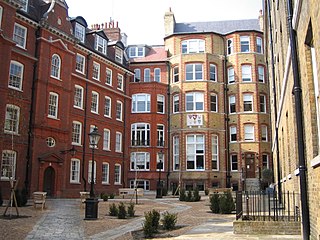
The Honourable Society of the Inner Temple, commonly known as the Inner Temple, is one of the four Inns of Court in London. To be called to the Bar and practise as a barrister in England and Wales, a person must belong to one of these Inns. It is located in the wider Temple area of the capital, near the Royal Courts of Justice, and within the City of London.
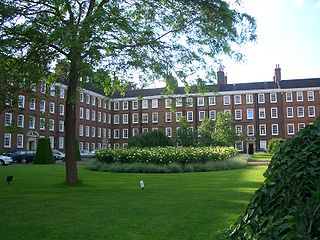
The Honourable Society of Gray's Inn, commonly known as Gray's Inn, is one of the four Inns of Court in London. To be called to the bar and practise as a barrister in England and Wales, a person must belong to one of these inns. Located at the intersection of High Holborn and Gray's Inn Road in Central London, the inn is both a professional body and a provider of office accommodation (chambers) for many barristers. It is ruled by a governing council called "pension", made up of the masters of the bench, and led by the Treasurer, who is elected to serve a one-year term. The inn is known for its gardens, or walks, which have existed since at least 1597.
The call to the bar is a legal term of art in most common law jurisdictions where persons must be qualified to be allowed to argue in court on behalf of another party and are then said to have been "called to the bar" or to have received a "call to the bar." "The bar" is now used as a collective noun for barristers, but literally referred to the wooden barrier in old courtrooms, which separated the often crowded public area at the rear from the space near the judges reserved for those having business with the Court. Barristers would sit or stand immediately behind it, facing the judge, and could use it as a table for their briefs.

The Inns of Court in London are the professional associations for barristers in England and Wales. There are four Inns of Court – Gray's Inn, Lincoln's Inn, Inner Temple and Middle Temple.

The Temple refers directly to the surroundings of Temple Church. It is one of the main legal districts in London and a notable centre for English law, historically and in the present day. It consists of the Inner Temple and the Middle Temple, which are two of the four Inns of Court and act as local authorities in place of the City of London Corporation as to almost all structures and functions.

The Inns of Chancery or Hospida Cancellarie were a group of buildings and legal institutions in London initially attached to the Inns of Court and used as offices for the clerks of chancery, from which they drew their name. Existing from at least 1344, the Inns gradually changed their purpose, and became both the offices and accommodation for solicitors and a place of initial training for barristers.

Robert Lionel Archibald Goff, Baron Goff of Chieveley, was an English barrister and judge who was Senior Lord of Appeal in Ordinary, the equivalent of today's President of the Supreme Court. Best known for establishing unjust enrichment as a branch of English law, he has been described by Andrew Burrows as "the greatest judge of modern times". Goff was the original co-author of Goff & Jones, the leading English law textbook on restitution and unjust enrichment, first published in 1966. He practised as a commercial barrister from 1951 to 1975, following which he began his career as a judge. He was appointed to the Judicial Committee of the House of Lords in 1986.

A bencher or Master of the Bench is a senior member of an Inn of Court in England and Wales or the Inns of Court in Northern Ireland, or the Honorable Society of King's Inns in Ireland. Benchers hold office for life once elected. A bencher can be elected while still a barrister, in recognition of the contribution that the barrister has made to the life of the Inn or to the law. Others become benchers as a matter of course when appointed as a High Court judge. The Inn may elect non-members as honorary benchers – for example, distinguished judges and lawyers from other countries, eminent non-lawyers or members of the British Royal Family, who become known as "Royal Benchers" once elected.
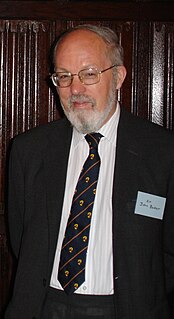
Sir John Hamilton Baker, QC, LLD, FBA, FRHistS is an English legal historian. He was Downing Professor of the Laws of England at the University of Cambridge from 1998 to 2011.

The City Law School is one of the five schools of City, University of London. In 2001, the Inns of Court School of Law became part of City, and is now known as The City Law School. Until 1997, the ICSL had a monopoly on the provision of the Bar Vocational Course (BVC), now known as the Bar Professional Training Course (BPTC), the obligatory professional training for would-be barristers in England and Wales, before they commence pupillage.
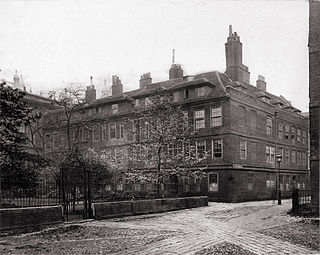
Clifford's Inn is a former Inn of Chancery in London. It was located between Fetter Lane, Clifford's Inn Passage, leading off Fleet Street and Chancery Lane in the City of London. The Inn was founded in 1344 and refounded 15 June 1668. It was dissolved in 1903, and most of its original structure was demolished in 1934. It was both the first Inn of Chancery to be founded and the last to be demolished.
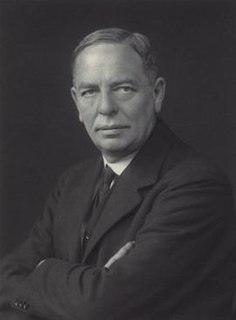
Sir Percy Maurice Maclardie Sheldon Amos was a British barrister, judge and legal academic who served as an Egyptian judge, advisor to the Egyptian government and Quain Professor of Jurisprudence.
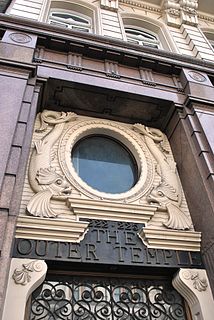
The Outer Temple is a building next to the Temple in London, just outside the City of London. In the 14th century, the property seized from the Knights Templar was divided, and that part of the Temple property then just outside London was given the name, Outer Temple. It has been suggested that the name Outer Temple once also referred to an Inn of Chancery; its historical existence was first posited by A. W. B. Simpson and confirmed by John Baker in 2008. Little is known of it, other than that it lacked a hall; Baker suggests that this is the reason that it did not survive long enough to appear in many records. Other writers have insisted that it was never an inn: Sir George Buck wrote in 1612 "the Utter Temple neither is nor was ever any college or society of students."
Herbert Broom (1815–1882) was an English writer on law.
John George Phillimore (1808–1865) was an English barrister, known as a jurist and Liberal Party politician.

George Spence (1787–1850) was an English jurist and politician.

King's Bench Walk is a street in Temple, in the City of London. It is mainly made up of barristers' chambers.
The Royal Commission on the Inns of Court carried out an investigation into the Inns of Court and associated Inns of Chancery between 1854 and 1855. The inns were medieval guild-like institutions that provided accommodation for lawyers and had developed gradually into centres for legal education. All barristers in the country had to be a member of one of the inns. It included many of the leading lawyers and jurists of the time. The commission found many of the inns, particularly the Inns of Chancery, were ineffective at educating students and recommended the creation of a single university of law. Steps were taken to accomplish this and a parliamentary bill was prepared but it was never achieved. The commission did, however, have an influence on legal education for decades and was a factor in the establishment of modern law schools at the universities of Cambridge, Oxford and London.
References
- ↑ "Inner Temple Admissions Database: Glossary". The Honourable Society of the Inner Temple. Archived from the original on 2011-03-14. Retrieved 2010-07-10.CS1 maint: discouraged parameter (link)
- 1 2 Simpson, A.W.B. (1975). "The Early Constitution of Gray's Inn". Cambridge Law Journal. Cambridge University Press. 34 (1): 138–139. ISSN 0008-1973.
- ↑ Ringrose, Hyacinthe (1909). The Inns of Court An Historical Description. Oxford: R.L. Williams. p. 81. OCLC 60732875.